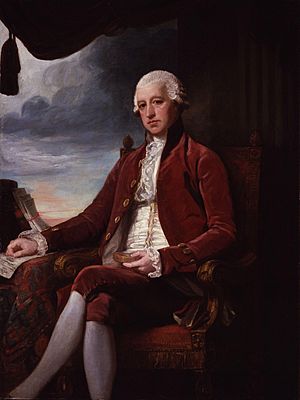Charles Jenkinson, 1st Earl of Liverpool facts for kids
Quick facts for kids
The Earl of Liverpool
|
|
|---|---|

Portrait by George Romney
|
|
| President of the Board of Trade | |
| In office 23 August 1786 – 7 June 1804 |
|
| Monarch | George III |
| Prime Minister | William Pitt the Younger Henry Addington |
| Preceded by | The Lord Sydney (President of the Committee on Trade and Foreign Plantations) |
| Succeeded by | The Duke of Montrose |
| Chancellor of the Duchy of Lancaster | |
| In office 6 September 1786 – 11 November 1803 |
|
| Monarch | George III |
| Prime Minister | William Pitt the Younger Henry Addington |
| Preceded by | The Earl of Clarendon |
| Succeeded by | Lord Pelham |
| Personal details | |
| Born | 26 April 1729 Oxfordshire, England |
| Died | December 17, 1808 (aged 79) London, England |
| Spouses |
Amelia Watts
(m. 1769; died 1770)Catherine Bishopp
(m. 1782) |
| Alma mater | University College, Oxford |
Charles Jenkinson, 1st Earl of Liverpool (born April 26, 1729 – died December 17, 1808), was an important British politician. He was also known as Lord Hawkesbury for a time. Charles Jenkinson was the father of Robert Jenkinson, 2nd Earl of Liverpool, who later became the Prime Minister of the United Kingdom.
Contents
Who Was Charles Jenkinson?
Charles Jenkinson was born in Oxfordshire, England. He was the oldest son of Colonel Charles Jenkinson. His family had a history of interesting people, including Anthony Jenkinson, a famous sea captain and explorer from the 1500s.
Charles went to Charterhouse School and then to University College, Oxford. He finished his studies at Oxford in 1752.
Starting a Political Career
In 1761, Charles Jenkinson became a member of Parliament for Cockermouth. He quickly became an Under-Secretary of State, working for Lord Bute. He gained the trust of King George III.
When Lord Bute retired, Jenkinson became a key leader in the House of Commons. He was known as one of the "King's Friends," meaning he strongly supported the King's ideas.
Important Government Roles
Charles Jenkinson held many important jobs in the government:
- In 1763, he became a joint Secretary to the Treasury. This role involved managing the country's money.
- In 1766, he worked as a Lord of the Admiralty, dealing with the navy, and then as a Lord of the Treasury.
- By 1772, he was made a Privy Councillor. This meant he was a trusted advisor to the King. He also became Vice Treasurer of Ireland.
- From 1778 to 1782, he was the Secretary at War, responsible for military matters.
Becoming Lord Hawkesbury and Earl of Liverpool
Charles Jenkinson was very trusted by King George III. In 1786, he was given the title of Baron Hawkesbury. Ten years later, in 1796, he became the Earl of Liverpool.
He also took over his family's estates in 1790. He lived at Addiscombe Place in Surrey and in Hawkesbury, Gloucestershire. He passed away in London on December 17, 1808.
Family Life
Charles Jenkinson was married twice.
- His first wife was Amelia Watts, whom he married in 1769. She passed away in 1770, shortly after their son, Robert, was born.
- In 1782, he married Catherine Bishopp. They had a son named Charles, who later became the 3rd Earl of Liverpool. They also had a daughter, Charlotte.
When Charles Jenkinson, the 1st Earl of Liverpool, died, his son Robert took over his title. Robert went on to become a very important politician and even the Prime Minister of the United Kingdom.
Lasting Impact
Charles Jenkinson wrote several books about politics. His most well-known work is a book about the country's money system, called Treatise on the Coins of the Realm, published in 1805.
His titles also inspired names for places far away!
- The Hawkesbury River in New South Wales, Australia, was named after him when he became Baron Hawkesbury.
- The town of Hawkesbury, Ontario, Canada, also got its name from him.
Two ships were also named after him as "Lord Hawkesbury." One was a whaling ship, and the other was an East Indiaman, a large ship used for trade.
Images for kids
-
Addiscombe Place, where Charles Jenkinson lived.
 | Selma Burke |
 | Pauline Powell Burns |
 | Frederick J. Brown |
 | Robert Blackburn |


